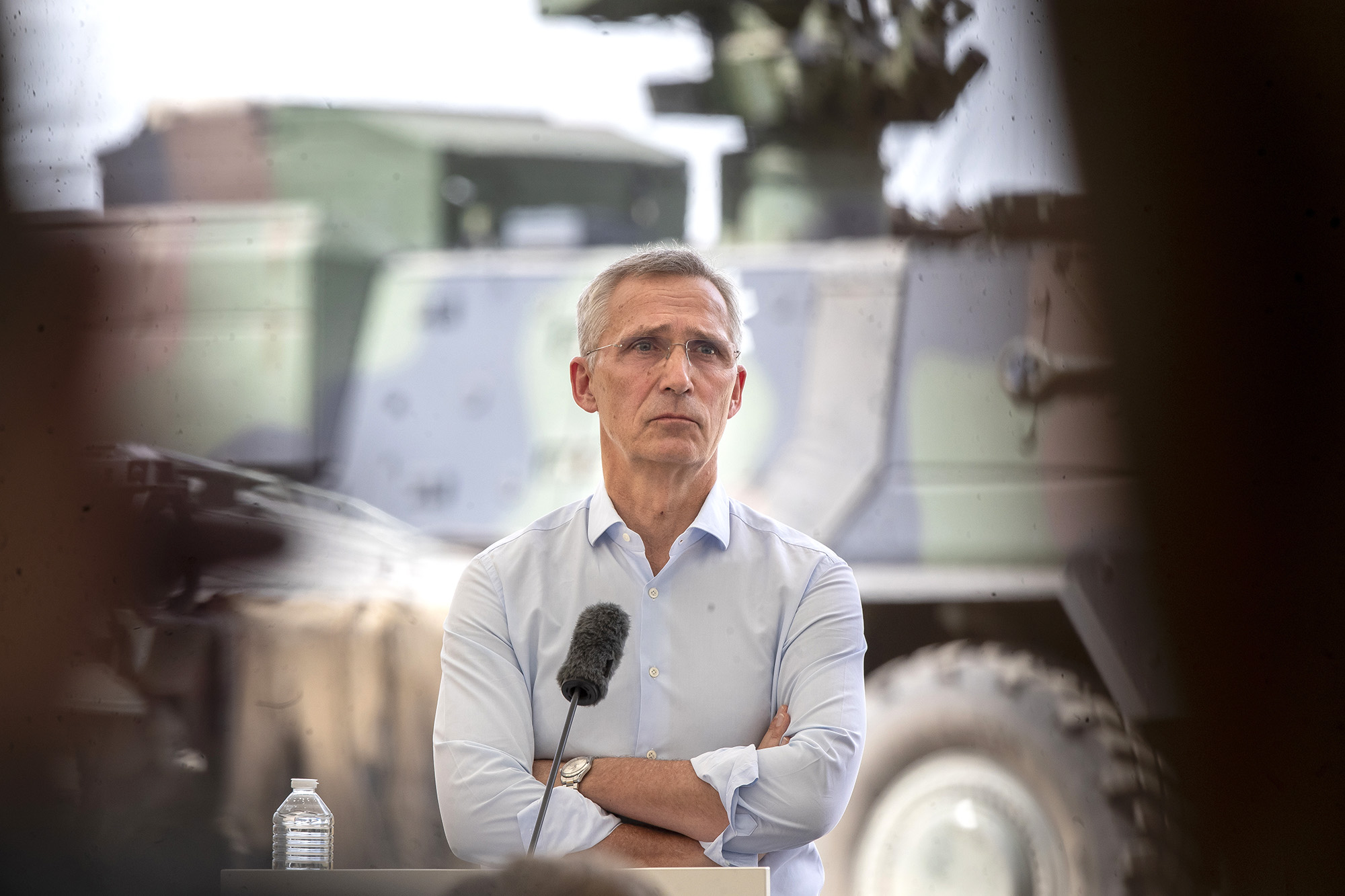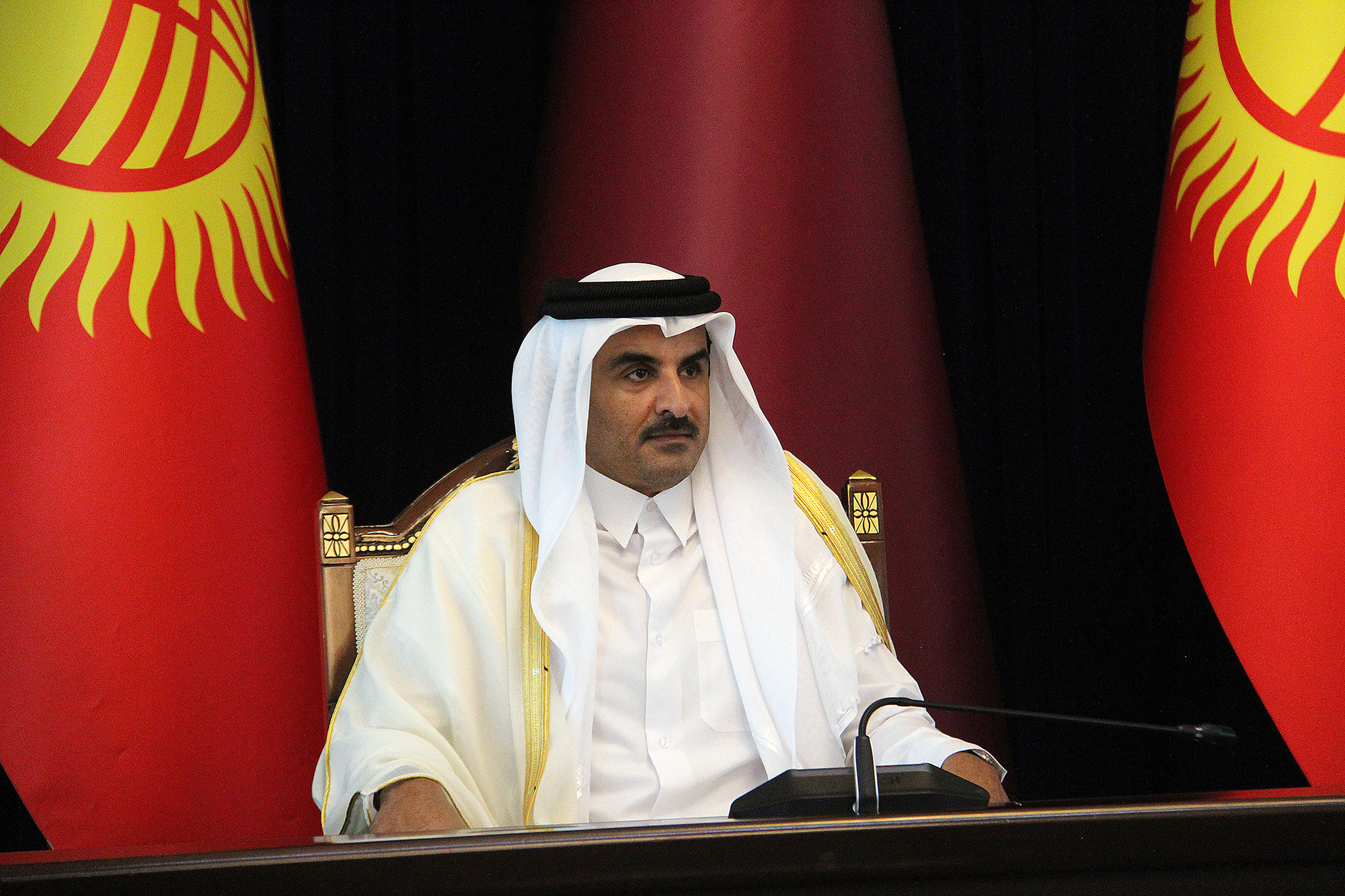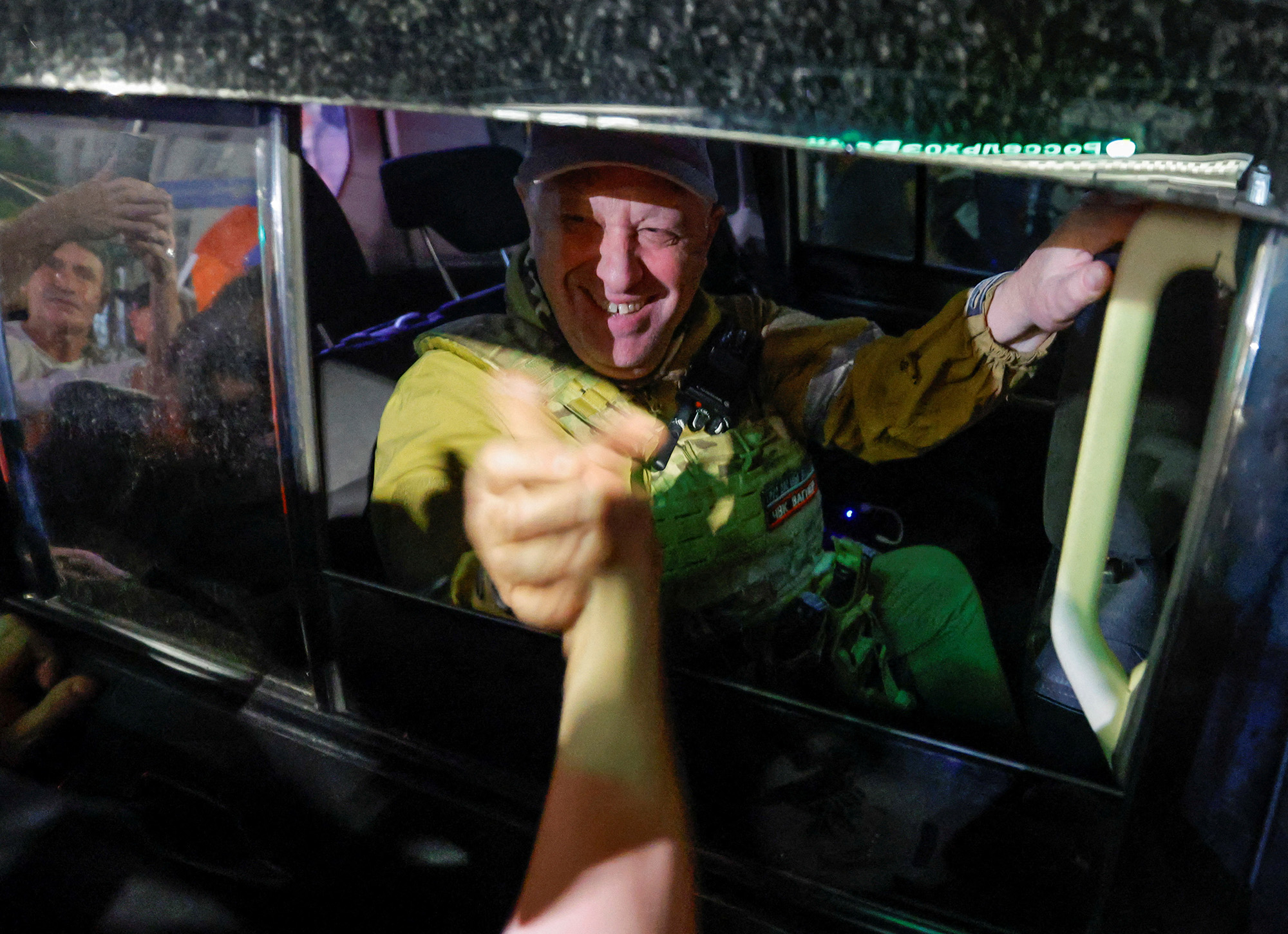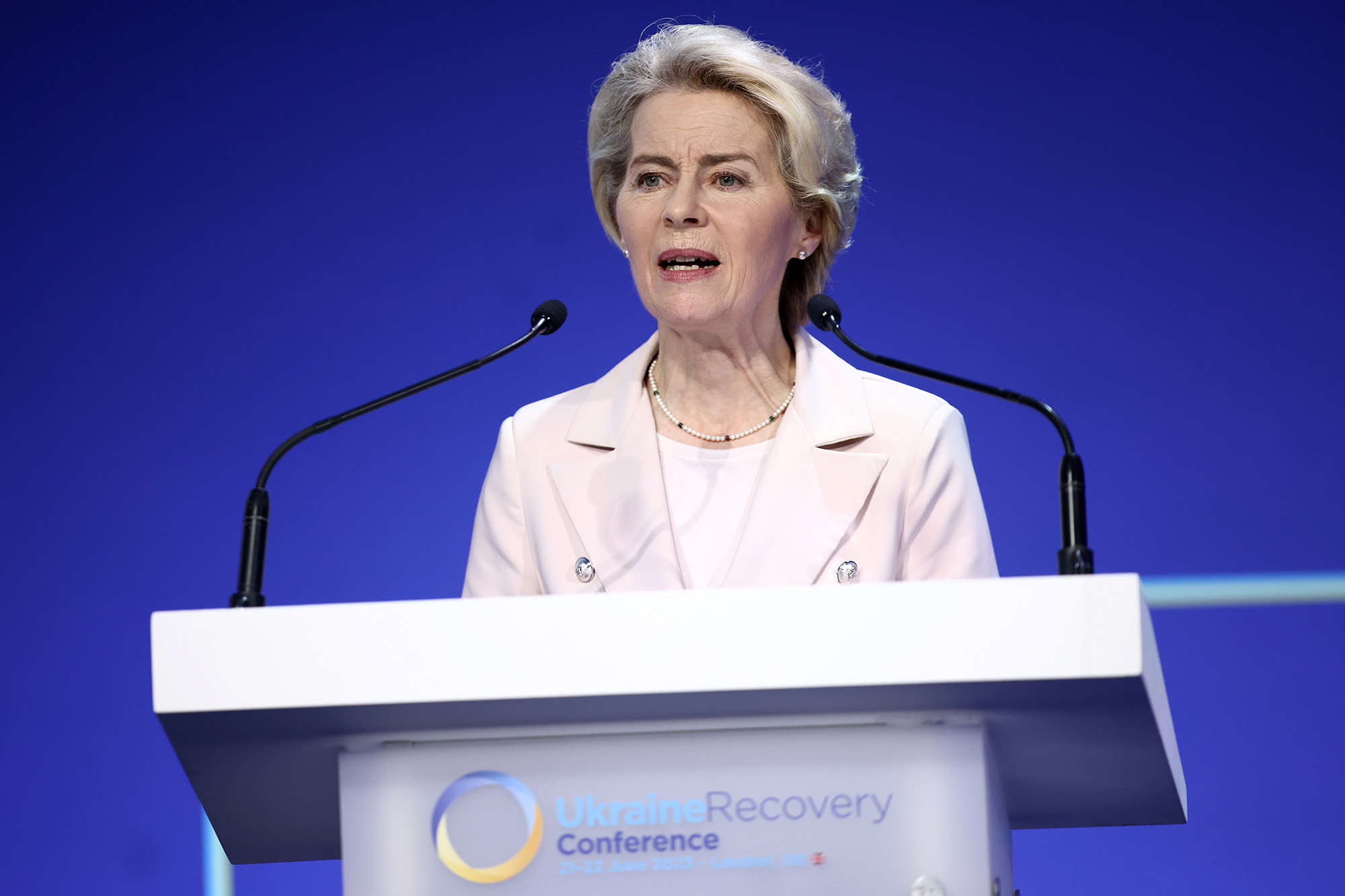From CNN's Radina Gigova in London

The developments in Russia over the weekend show the "weakness" and "fragility" of the Russian regime, NATO Secretary-General Jens Stoltenberg said Monday.
Wagner boss Yevgeny Prigozhin's armed insurrection "demonstrated how difficult and dangerous it is for President [Vladimir] Putin to be relying on mercenaries that have actually turned against him," Stoltenberg said.
Stoltenberg went on to say that it is unclear what will happen in Russia over the next days and weeks. He added that NATO allies should not make the mistake of "underestimating" Moscow.
"So we need to continue to provide support to Ukraine, that's exactly what NATO and NATO allies are doing with military support but also support for the long term. And that's in a way what we can say today about the effects on the battlefield in Ukraine," he said during a news conference in Lithuania, alongside German Defense Minister Boris Pistorius and Lithuania's President Gitanas Nauseda.
What we know: Prigozhin on Friday accused Russia’s military of attacking a Wagner camp and killing a “huge amount” of his men. He vowed to retaliate with force, insinuating that his forces would “destroy” any resistance, including roadblocks and aircraft.
By Saturday, Prigozhin announced that he was turning his forces around from a march toward Moscow shortly after the Belarusian government claimed President Alexander Lukashenko had reached a deal with him to halt the advance. Prigozhin said the move was in accordance with an unspecified plan and intended to avoid Russian bloodshed.
Belarusian officials said they cannot confirm if Prigozhin has arrived in the country or what his status will be.
Ukraine claims to have liberated the southeastern settlement of Rivnopil in Donetsk
From CNN's Maria Kostenko in Kyiv
Ukraine has regained control of Rivnopil, a southeastern settlement in the Donetsk region on the Zaporizhzhia border, Ukraine's deputy defense minister claimed.
"We are moving forward," Hanna Maliar said Monday on Telegram.
CNN cannot independently verify this claim.
In a video posted online Monday by the Joint Press Center of the Tavria Defense Forces, a Ukrainian soldier said, "soldiers of the 2nd Mechanised Battalion of the 31st Mechanized Brigade liberated the village of Rivnopil. The orcs are fleeing, we are moving forward. Glory to Ukraine!"
On Thursday, Andriy Kovalov, spokesperson for the General Staff of the Armed Forces of Ukraine, said Ukrainian forces were partially successful in the Rivnopil-Staromaiorske direction and were "entrenching on the achieved frontiers."
Putin talked to leaders of a few countries after the Wagner insurrection, including Iran
From CNN's Anna Chernova and Mostafa Salem

Russian President Vladimir Putin had a phone call with Iranian President Ebrahim Raisi, the Kremlin said Monday.
“The President of Iran expressed full support for the Russian leadership in connection with the events of June 24,” a Kremlin readout read.
It was one of a few known phone calls the Russian President had with foreign leaders following the weekend, which saw a brief insurrection by Wagner troops.
Iran's official news agency IRNA confirmed the two leaders "had a telephone conversation after the failed rebellion of the 'Wagner' militant group."
UK is prepared for a "range of scenarios" in Russia after insurrection, prime minister says
From CNN's Radina Gigova in London

The United Kingdom is prepared for a "range of scenarios" in Russia following the insurrection attempted by Wagner boss Yevgeny Prigozhin over the weekend, UK Prime Minister Rishi Sunak said Monday.
Sunak noted the UK has been "analyzing and monitoring" the situation for some time and is in close touch with allies "to make sure that we're coordinated." The prime minister also said he spoke with the leaders of the United States, France and Germany over the weekend.
"It's too early to predict with certainty what the consequences of this might be, but of course, we are prepared, as we always would be, for a range of scenarios," he told reporters during a visit to Nottingham.
Russian President Putin holds a phone call with the Emir of Qatar Sheikh Tamim
From CNN’s Anna Chernova and Mostafa Salem

Russian President Vladimir Putin and Emir of Qatar, Sheikh Tamim bin Hamad Al Thani, held a phone call on Monday, statements said.
However, the countries had different readouts for the call.
The Kremlin said that Sheikh Tamim expressed his support for Putin’s actions in dealing with the attempted armed mutiny that took place on Saturday.
But the Qatari statement by the Diwan said the Emir "discussed the latest developments in Russia" and called for resolving differences through "dialogue and diplomatic means, settling international disputes by peaceful means" and discouraging "further escalation on the ground."
Sheikh Tamim "also renewed the position of the State of Qatar calling for the need to respect Ukraine's sovereignty and territorial integrity within its internationally recognized borders," the statement added.
Both leaders agreed to maintain contact in the future.
Some Russians cheered as Wagner mercenaries sped through their streets towards Moscow
From CNN’s Matthew Chance and Mitchell McCluskey

Some Russians greeted the weekend’s armed insurrection led by the head of the Wagner paramilitary group, Yevgeny Prigozhin, with sympathy, appearing to welcome the mercenary fighters.
In the southern Russian city Rostov-on-Don, which was briefly occupied by Wagner troops, videos showed residents cheering them on, taking pictures with fighters, and flagging down Prigozhin’s car just to shake his hand.
Videos circulating online also showed crowds in Rostov-on-Don applauding and chanting “Wagner is strength!” and “You are the best!”
Prigozhin’s so-called “march of justice” – which stopped short of capital city Moscow – was harshly condemned by the Kremlin on Saturday, with a furious President Vladimir Putin vowing to punish those “on a path to treason.”
But at least one Rostov-on-Don resident seemed curious why they did not go further.
“What kind of demands are you making to the authorities? Why are you not doing it in Moscow? Why did you not go to Moscow?” the resident asks in another social media video.
“I always admired you, always. I always admired how you fought,” the resident added.
Russia faced "challenge" to internal stability, says Russian prime minister
From CNN’s Anna Chernova
Russian Prime Minister Mikhail Mishustin acknowledged Monday that the country faced a “challenge” to its internal stability, in his first address to the cabinet of ministers in the wake of the brief armed mutiny by Wagner boss Yevgeny Prigozhin and his mercenaries on Saturday.
“These days the country faced an obvious challenge, an attempt was made to destabilize the internal situation in Russia,” Mishustin told ministers in a video meeting with cabinet members.
Mishustin added that government members were “at their workplaces” and commended the government members for their response to the threat.
“Under the leadership of the president, they acted clearly, in a coordinated manner, and maintained the stability of the situation at all levels in order to prevent the situation from worsening and protect citizens from all possible threats that might arise,” he said.
“We need to act together, as one team, and maintain the unity of all forces, rallying around the president. Make well-considered joint decisions for the effective implementation of the tasks set by the head of state,” he added.
Mishustin described current events as Russia experiencing a crucial period in its history facing significant challenges from Western countries, which are aimed at undermining Russia's ability to pursue its “own path.”
“Today Russia is going through an important period in its history. As the president noted, virtually the entire military, economic, information machine of the West is directed against us. In fact, there is a struggle for the right to choose one's own path, based on national interests for the benefit of one's people,” the head of government said.
EU agrees to $3.8 billion top up of Ukraine military aid fund
From CNN’s Niamh Kennedy and Sarah Dean in London

European Union member states agreed on Monday to a $3.8 billion (€3.5 billion) top up to the European Peace Facility, as Ukraine’s foreign minister called on the bloc to “accelerate” Russia’s defeat.
The fund has been used by EU member states to finance military aid for Ukraine.
It comes after Ukraine’s foreign minister Dmytro Kuleba called on EU foreign ministers attending the Foreign Affairs Council on Monday to “accelerate Russia’s defeat by stepping up support for Ukraine.”
Key context: The further support committed by the EU for Ukraine follows the bloc’s announcement last week of the 11th round of sanctions against Russia.
“The package includes measures aimed at countering sanctions circumvention and individual listings,” the Swedish Presidency of the EU Council said Wednesday.
President of the EU Commission Ursula von der Leyen welcomed the sanctions package, saying "it will deal a further blow to Putin’s war machine with tightened export restrictions, targeting entities supporting the Kremlin."
"Our anti-circumvention tool will prevent Russia from getting its hands on sanctioned goods," she tweeted.
Analysis: Has the chaos in Russia changed the Western approach to Ukraine?
Analysis from CNN's Luke McGee
In short: No. Western officials told CNN over the weekend that while they were monitoring the situation and understood the severity of the challenge to Russian President Vladimir Putin’s authority, it did not fundamentally change the objectives of Ukraine’s Western allies.
There are, of course, many unanswered questions as to exactly what happened and where it leaves Putin. But for the West – especially the NATO allies – the facts and assumptions that drive their Ukraine strategy have not changed.
First, Putin is still in power and still has objectives that are unpalatable to the Ukrainian government, which means that they are unpalatable to the Western allies of Ukraine. There is no assumption that a chastened Putin will suddenly become a partner that can be trusted to negotiate peace. There is no sense that Putin’s attitude to the West will soften. There is no belief that even if Putin had a sudden change of heart that he wouldn’t continue to act as a belligerent as soon as an opportunity presented itself.
Second, even if the insurrection had led to some kind of change at the top of Russia’s government, the people who toppled Putin would have been equally committed Russian nationalists who have been willing to commit war crimes in this war.
At the time of writing, no major Western sources are presenting evidence that Russia’s hectic weekend has presented weaknesses that Ukraine can specifically exploit in its counteroffensive against Russia. Sources specifically highlighted that even if events in Russia do create opportunities, Ukrainian forces will still face deeply-bedded Russian resistance. And there is concern that a wounded Putin may strike back even harder.
That could all change in the coming hours if such evidence comes to light. But it’s always worth keeping in mind that diplomacy and international relations tend to move at a slower pace than breaking news.